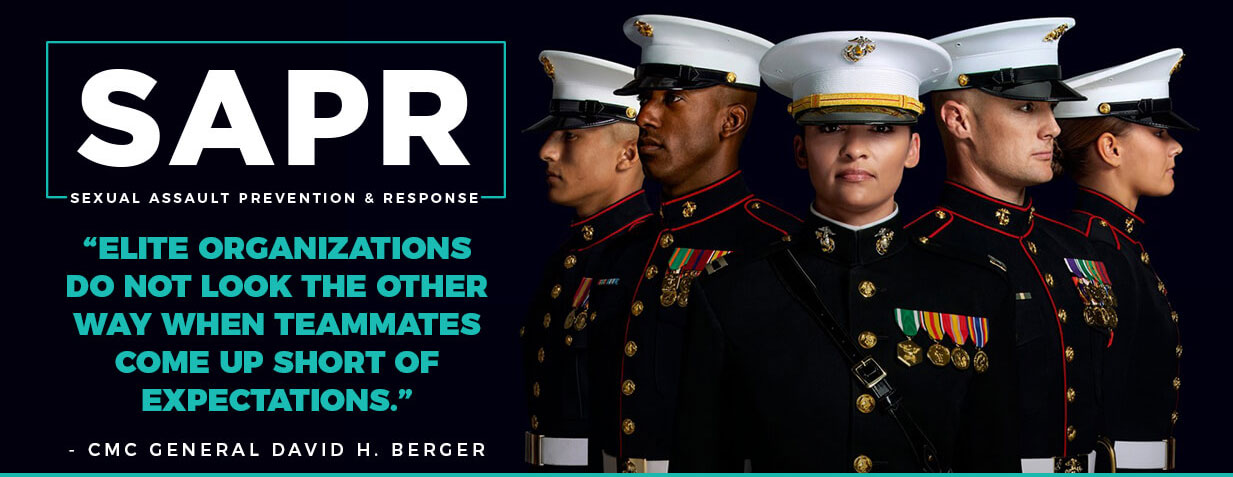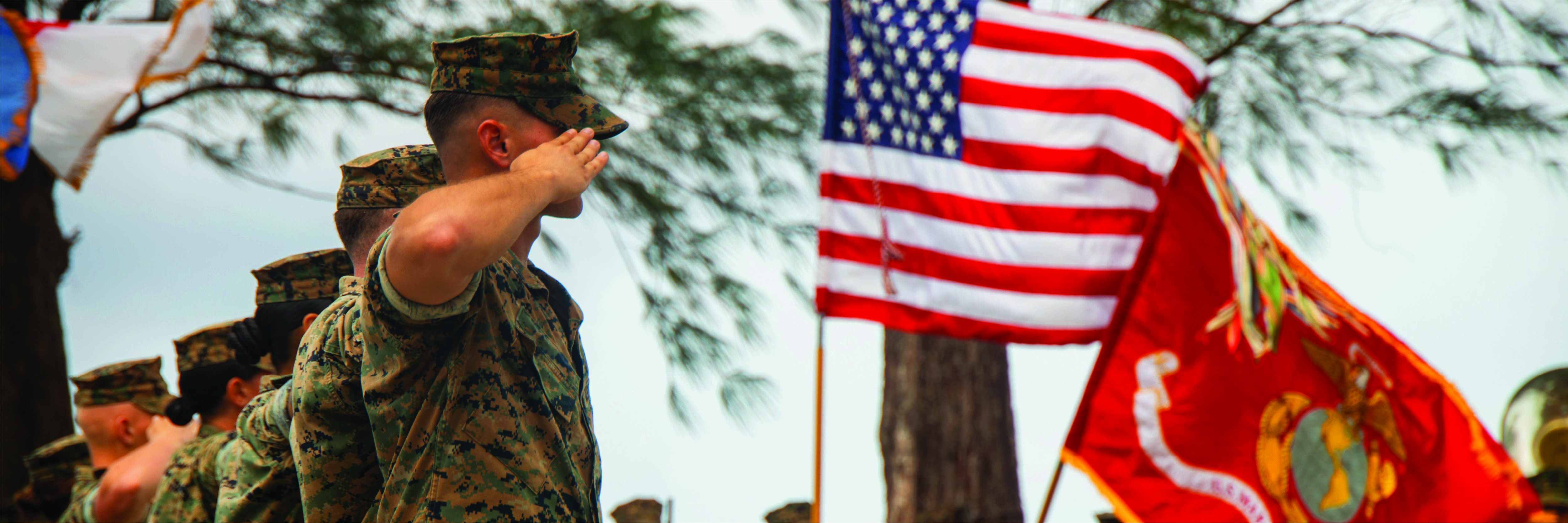Sexual Assault Prevention and Response
On this page:
On this page:









Sexual Assault is a crime. It can happen to anyone. The Department of Defense defines sexual assault as "intentional sexual contact, characterized by the use of force, threats, intimidation, or abuse of authority or when the victim does not or cannot consent."
After a sexual assault occurs, some people may want to question what someone did before, during, or after the sexual assault, which can lead to “victim blaming.” The person who was assaulted is never to blame for what happened to them. Nothing they did (or did not do) makes them responsible for the assault.
What Is Consent . . .
Consent is given with words or overt acts indicating a freely given agreement to the sexual contact by a "competent" person. You are considered "incompetent" if you are sleeping or incapacitated, due to alcohol or drug use, mental incapacity, or age.
What Is NOT Consent . . .
Lack of verbal or physical resistance is not consent. Neither is submission, cooperation, compliance, or coercion. When someone is under threat, in fear, sleeping, or incapacitated, there is no consent. Also, a current or previous dating relationship and manner of dress at the time do not mean consent. A person cannot consent if someone makes a false representation that the act serves as a professional purpose or creates a belief that the subject is another person. Someone’s previous sexual acts, experiences, and/or history does not constitute consent. For the full legal definition of consent, please see Marine Corps Order 1752.5C.
There are a few important things to remember about consent. You should never make assumptions or guesses about what the other person is thinking or feeling. If there is any doubt at any point, either ask if the person you are with is okay with what is happening or just back off. Consent is active and ongoing, which means at any point consent can be withdrawn. Consent is required for all sexual encounters, but it is the bare minimum, not what someone should be striving for when it comes to sex. Talking about each other’s sexual boundaries then respecting the other person’s boundaries are key elements in making sure everyone has an enjoyable experience whether it is a one-time thing or in a long-term relationship.
What Offenses Are Sexual Assault?
Sexual assault includes a broad category of sexual offenses, including rape, forcible sodomy (oral or anal sex), and other unwanted sexual contact that is aggravated, abusive, or wrongful (including unwanted and inappropriate sexual contact) or attempts to commit these acts.
Related Articles
If you were sexually assaulted, there are some things you may want to consider doing to keep yourself safe and healthy. You may also want to think about preserving the evidence and reaching out to people who are ready to listen.
Consider Taking These Steps
- Go to a safe place away from the alleged offender. If you are in danger or feel threatened, contact PMO/law enforcement immediately.
Note: You cannot file a 'Restricted Report' if you disclose a sexual assault to PMO/law enforcement and/or previously elected to make an Unrestricted Report by signing a DD Form 2910 on the same sexual assault incident. - Preserve evidence of the assault. For instance:
- Do not take a shower or a bath.
- Do not wash your hands or brush your teeth.
- Do not clean up or remove anything from the crime scene.
- Contact a Sexual Assault Response Coordinator (SARC), or SAPR Victim Advocate (VA), who will:
- Keep your report confidential.
- Inform you of the Restricted & Unrestricted reporting options.
- Provide you with resources and support.
- Seek medical care to take care of physical injuries, risk of pregnancy, or sexually-transmitted infections.
- Request a Sexual Assault Forensic Exam (SAFE) to collect evident from the assault.
- Consider a blood test or urinalysis if you suspect you were drugged. (Note: For unrestricted reports only)
No matter where you are in the world, free and confidential help is available.
Contact the DoD Safe Helpline - 24/7 Confidential Toll-free call at 1-877-995-5247 or at www.safehelpline.org and search by unit or installation name or zip code to find SAPR resources or rape crisis centers near you.
For those on or close to a USMC Installation, call your local 24/7 SAPR helpline. Each helpline is staffed by a trained SAPR VA who will talk to you and refer you to resources that might be helpful.
Related Articles
Survivors of military sexual assault are never alone – no matter when or where assistance is needed. Marines and their families have immediate access to resources and referrals by calling their installation’s 24/7 Sexual Assault Support Line.
The Sexual Assault Prevention and Response (SAPR) Victim Advocates (VAs) and Sexual Assault Response Coordinators (SARCs) who staff these support lines are dedicated to getting it right. A single phone call may be the only chance SAPR VAs or SARCs get to make a difference in the life of a survivor, so they are trained to give their best effort every time.
DOD Safe Helpline Live Chat
24/7 Helpline For Your Local Installation
- Camp Lejeune – New River
- 910-750-5852
10 Things to Know about 24/7 Support
- Anywhere – Each United States Marine Corps (USMC) installation has a 24/7 Sexual Assault Support Line to assist sexual assault survivors with appropriate care and critical information.
- Anytime – 24/7 Sexual Assault Support Lines ring directly to cell phones held by the installation’s SAPR VA or SARC.
- Knowledgeable – All SAPR VAs and SARCs who answer the 24/7 Support Lines are credentialed by the Department of Defense (DOD) Sexual Assault Advocate Certification Program (D-SAACP).
- Dependable – No call by a survivor ever goes unanswered. After five rings, a call to the 24/7 Sexual Assault Support Line is automatically forwarded to the DOD Safe Helpline.
- Local – After receiving a forwarded call, DOD Safe Helpline personnel will always try to connect the survivor back to the appropriate installation 24/7 Sexual Assault Support Line.
- Supportive – Whether assisted by DOD or the installation’s SAPR VA or SARC, the survivor will always be provided with immediate crisis support and referrals to appropriate services.
- Personal – If requested, a credentialed SAPR VA or SARC will meet with the survivor within two hours of the initial call for any reason related to the sexual assault. It’s totally up to the caller.
- Confidential – Calls to the 24/7 Sexual Assault Support Lines and the DOD Safe Helpline are strictly confidential. Survivors will not be asked for personally identifiable information.
- Professional – 24/7 Sexual Assault Support Lines are audited monthly to make sure the response system is timely, efficient, and effective and to correct any identified issues.
- Quality Care – The Marine Corps SAPR Program is committed to providing survivors of sexual assault with comprehensive, quality care.
24/7 Sexual Assault Support Lines have connected hundreds of survivors with a trusted, confidential source of support since 2010. Whether looking for specific information or just someone to talk to about a sexual assault, round-the-clock help is just a phone call away.
If you are deployed or stationed at a non-USMC installation, contact your SAPR VA for assistance or call the DOD Safe Helpline at 1-877-995-5247.
Related Articles
You may have a friend, loved one, or family member who was sexually assaulted. They may be struggling to get through this tragic event and reach out to you for help. If you are unsure of the best way to be supportive, consider these "Dos" and "Don'ts" when offering support.
DO listen.
Sometimes the best thing you can do is just be a good listener. If you are talking more than you are listening, you're listening skills may need some work.
DO be patient.
Recovery from trauma does not have a set timetable. Try to avoid pressuring them to seek help or engage in activities they aren’t ready to do. Ask them what they would like to do and support them in their choice (as long as it is not harmful). It is very important in the healing process for your friend to have control over what happens next.
DON'T judge.
People who were sexually assaulted can be scrutinized or even blamed for what happened to them. No one asks to be sexually assaulted. The alleged offender is 100 percent responsible for the crime.
DON'T ask for details.
You don't need to know the "who, what, when, where, how and why" of the assault. Your friend will take the lead on whether he or she wants to "get into the details."
DO use phrases such as:
"You're safe now” (only if that is true)
"I'm glad you're talking to me."
"I'm sorry it happened."
"It wasn't your fault."
"It’s ok that you’re reacting this way. There’s not a right or wrong way to respond to what happened."
"It must have been really upsetting to experience that.
"I can't imagine how you must feel.'
DON'T use phrases such as:
"What were you wearing?"
"How much did you have to drink?"
"You're lucky that . . ."
"It'll take some time, but you'll get over it."
"I can imagine how you feel."
"Don't worry; it's going to be all right."
"Try to be strong for your children, spouse, etc."
"Calm down and try to relax."
DO ask if they are open to getting help.
Ask if your friend is open to seeking medical care or talking to a Sexual Assault Response Coordinator (SARC) or Sexual Assault Prevention and Response (SAPR) Victim Advocate (VA).
If your friend has just been through the assault, you may ask your friend about going to the SANE Emergency Department or offer to take your friend there yourself. If your friend agrees, you may also contact the SARC or SAPR VA at your installation.
DON'T leave them alone.
People who are sexually assaulted are often overwhelmed with feelings, including fear, shock, helplessness, hopelessness, despair, anger, anxiety, panic, and even suicidal thoughts. Before you leave your friend, ask if you can call someone else to provide support, like a SARC or SAPR VA.
DO take care of yourself.
When we have a friend in need or in pain, it can be difficult not knowing how to help. In helping a friend through this healing process, you may experience a whole range of feelings and emotions. You may feel anger, sadness, anxiety, confusion, guilt, helplessness, or even disbelief. RAINN (Rape, Abuse & Incest National Network), and the SAFE Helpline have great self-care resources that can help you feel less overwhelmed.
For more information about how to help someone, visit the Sexual Assault Prevention and Response page or visit SAFE Helpline for more confidential services.
Related Articles
When a victim of sexual assault decides to report, it's important to understand the options available. Knowing the difference between Restricted and Unrestricted Reporting will help you avoid issues down the road. Let's take a closer look.
Who does the SAPR Program cover?
The SAPR Program will continue to provide services to all adult sexual assault victims who are non-intimate partners and to adults of sexual assault who are unmarried intimate partners when they are not: a current or former spouse, share a child in common, currently or previously shared a domicile, and when domestic abuse is present. If the victim falls under one the categories (spouse/child/domicile/domestic abuse) the victim will be referred to Family Advocacy Program (FAP).
Knowing Your Options
Service members and military dependents (18 years and older) have two options when it comes to reporting sexual assault: Unrestricted or Restricted Reporting. The person will need to fill out a DD Form 2910 with assistance from a Sexual Assault Prevention & Response (SAPR) Victim Advocate (VA), or Sexual Assault Response Coordinator (SARC).
Unrestricted Reporting - is recommended for someone who desires a law enforcement investigation, and the support of the chain of command; unrestricted reporting provides the person with access to ALL supportive service options:
- Advocacy Services (support, information, referral, and accompaniment)
- Medical/Counseling Services
- Victims Legal Counsel
- Military Protective Order
- Civilian Protective Order
- Expedited Transfer
- CATCH Program when the name of suspect is not known by law enforcement
For an Unrestricted Report - Someone can disclose a sexual assault to the following people:
- SAPR Victim Advocate
- Sexual Assault Response Coordinator
- Healthcare Personnel
- Chaplain
- Victims Legal Counsel
- Chain of Command
- Law Enforcement
With Unrestricted Report, knowledge of the sexual assault is limited to those with an official need-to-know.
In the event of an independent investigation that is initiated by a third party reporting from a source other than the victim. The victims can elect not to participate in the investigation by signing a 540k Victim Preference Letter. The investigation may continue their investigation without the victim’s participation or the MCIO may agree to close the investigation. Speak to your SARC or SAPR VA for further information regarding the 540k Victim Preference Letter.
Restricted Reporting - is available for Service members and their SAPR eligible military dependents 18 years of age or older. Restricted Reports allows the person to confidentially disclose their sexual assault to certain individuals, does not trigger an investigation or command involvement, and allows them to access THESE supportive service options:
- Advocacy Services (support, information, referral, and accompaniment)
- Medical/Counseling Services
- Victims' Legal Counsel
- CATCH Program
A person who reported a sexual assault can choose to convert a Restricted Report to Unrestricted at any time. However, once an Unrestricted Report is made, the Restricted Reporting option is no longer available.
One may still elect a Restricted Report if they did not personally report the sexual assault to law enforcement, including MCIOS, and/or did not previously elect to make an Unrestricted Report by signing a DD Form 2910 on the same sexual assault incident.
In the event a victim or third party discloses a Restricted Report to the command, it does not negate the command from the standard notification and reporting responsibilities. The commander will not ask SARC for details nor will they speak to the victim about the incident.
For a Restricted Report- ** Some state and local laws require healthcare personnel to disclose sexual assault incidents to law enforcement. NDAA FY 16 Section 536 preempts mandatory reporting laws if the person reports to an MTF first, thereby preserving the Restricted Reporting option. Your SAPR VA can help you navigate your state and local laws.
Retaliation:
The following individuals are eligible to report a retaliation in nexus to an Unrestricted Report to a SARC or SAPR VA via a signed DD Form 2910-2:
- Victims with an Unrestricted Report
- Adult sexual assault victim’s adult family members
- Witnesses/Bystanders/1st Responders to include SARC and SAPR VAs
As a leader, you may encounter a situation where there is a sexual assault in your unit. Knowing how to respond swiftly, appropriately, and sensitively is important in order to protect the survivor and ensure a positive and cohesive command climate is maintained. Below is some information and additional resources that you may find helpful in navigating sexual assault in your unit.
Taking care of Marines is the plan of the day, every day. Doing it well requires constant training. The best leaders are voracious consumers of knowledge. The Marine Corps Warfighter Mental Readiness Playbook is a guide for effective influence.
Command Leadership Responsibilities
Per DoD policy, there are requirements that must be met to ensure the health and safety of survivors and to maintain unit cohesion through a positive command climate, if sexual assault occurs or is reported at your unit. DoDI 6495.02 outlines in detail Sexual Assault Prevention and Response Program Procedures for the Department. Additionally, each Service and NGB has a policy on sexual assault. Links to Service and NGB specific policy, guidance, and resources can be found below. For additional information, you can also contact your local Sexual Assault Response Coordinator (SARC).
Service members have two reporting options: Restricted and Unrestricted. If a Service member discloses a sexual assault to law enforcement and/or previously elected to make an Unrestricted Report by signing a DD Form 2910 on the same sexual assault incident they are not eligible to make a Restricted Report. DoD SAPRO outlines the process for both reporting options in a step-by-step guide. This guide contains important information on how to maintain a survivor’s safety and privacy throughout the reporting process. You can access the guide Victim_Reporting_Options_Guide (sapr.mil) here.
Survivors of sexual assault shall be protected from coercion, retaliation, and reprisal in accordance with DoDI 6495.02. Retaliation can unjustly harm the lives and careers of survivors, bystanders, and responders. Retaliation has no place in the military and you must do your part to ensure an ethical and just command intolerant of such behavior. For more information about retaliation, including reporting resources for survivors go to Resources (marines.mil).
To help ensure a comprehensive and appropriate response, DoD SAPRO has compiled a checklist of what should happen within the first 30 days of a survivor’s disclosure of sexual assault. You can access the checklist Commanders 30 Day Checklist | SAPR here.
Throughout the military investigative and justice process, Service members who make an Unrestricted Report of sexual assault are entitled to certain rights. To learn more about these rights, please go to Victims' Bill of Rights | SAPR.
Tips on How to Talk to a Survivor
Knowing what to say after a survivor has disclosed an assault can be difficult. While there is no one “right” thing to say to a survivor, an empathetic response to their disclosure is crucial. Here are some responses to let a survivor know that you support them:
“I’m so sorry this happened to you.” Showing a survivor empathy can build rapport and trust between you and the survivor.
“I’m here to help you get support.” A survivor trusted you and shared what happened to them. Let them know that you are there to ensure their safety and will respect their privacy.
“How can I help?” Let the survivor know that you are there for them. Ask them how you can help can put decisions into their hands and help them feel more in control about what is happening. However, it is also important to be clear about your role, any limitations you may have, and other avenues of support available to them.
This is not a comprehensive list of what you can say to a survivor to show empathy. Commanders can find tips on what to say and what not to say to survivors of sexual violence in the Safe Helpline self-paced course, How to Support a Survivor, or by reviewing the information on this webpage.
What is Safe Helpline?
Established in 2011, Safe Helpline is the Department of Defense’s (DoD) sole hotline for members of the DoD community affected by sexual assault. Safe Helpline is a completely anonymous, confidential, 24/7, specialized service—providing help and information anytime, anywhere. A Safe Helpline user can access one-on-one support, peer-to-peer support, information, resources, and self-care exercises 24/7 to aid in their recovery.
How Safe Helpline Can Support You and Your Unit
Our highly trained Safe Helpline staff are available to answer your questions, provide resources and get you contact information for a variety of on-base and off-base resources. You can connect with a staff member by calling 877-995-5247.
The Online Helpline, an anonymous online platform, provides the same services as the Telephone Helpline described above. You can access the anonymous Online Helpline 24/7 by logging on to our website at safehelpline.org.
Marine Corps Resources
Contact Information and Resources
Helplines
24/7 Sexual Assault Support Line: 9107505852
24/7 Domestic Violence Helpline: 9103765675
DoD SAFE: 8779955247
Military OneSource Help: 8003429647
Veterans Crisis Line (Press 1): 8002738255
Hours of operation:
| Sunday | CLOSED |
| Monday | 8AM - 4PM |
| Tuesday | 8AM - 4PM |
| Wednesday | 8AM - 4PM |
| Thursday | 8AM - 4PM |
| Friday | 8AM - 4PM |
| Saturday | CLOSED |
| Holiday hours may vary. | |




